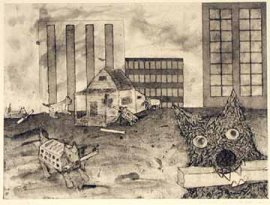 As new details emerge from the recent Maoist central committee meeting at Kami Danda of Kavrepalanchok district, the precariousness of Nepal’s plight is becoming all too perceptible.
As new details emerge from the recent Maoist central committee meeting at Kami Danda of Kavrepalanchok district, the precariousness of Nepal’s plight is becoming all too perceptible.Since the meeting, the Maoists have grown increasingly critical of the Seven Party Alliance (SPA) government’s alleged teaming up with the palace and “some foreign forces” to subvert the peace process.
By threatening to launch a “Kathmandu-centric revolution,” the Maoist central committee has endorsed Prachanda’s earlier pledge that the rebels would not return to the jungle. Yet the real import of the decision lies in the rebels’ eagerness to reap the return on their investment in the April Uprising. The Maoists seem to be convinced that their utility as part of the broader anti-palace alliance ended the night King Gyanendra reinstated the House of Representatives.
A formal repudiation of the alliance with the SPA at this late stage would do greater harm to an organization that has always considered itself ahead of everyone else in the game. Denouncing the Indian architects of last November’s accord would expose the Maoists’ own susceptibility to some of the same “foreign forces” they currently castigate.
A full-fledged withdrawal from the peace process might placate the radical base, but it would vindicate the royal government’s stance. So Prachanda does the best possible thing. He appoints himself heads of a 10-member team to facilitate the peace process and then stands in the way by adding outrageous demands.
The Maoists now insist they will not lay down weapons until ethnic and regional autonomy with the right of self-determination is guaranteed, the monarchy abolished and the army restructured.
What is particularly revealing is that folks like Nepali Congress leader Ram Chandra Poudel, who until the other day saw the Maoists as reasonable republican cohorts, are now hitting out hard against the rebels.
The international community, which implacably refused to recognize the legitimacy of King Gyanendra’s three-year roadmap, got its way in half that time. Now it’s in for some amusement. Once the leading advocate of United Nations involvement in an elaborate peace process, Prachanda has now inflicted a heavy blow on the organization’s severely curtailed arms-management jurisdiction. Reversing an assurance he gave to the Mistura mission, the rebel supremo now insists he would not be ready even to confine the Maoist militia to specific cantonments unless both the armies were treated on par.
Ian Martin, who as the top UN human rights monitor consistently ridiculed the royal regime’s deep distrust in the Maoists, now has an opportunity, as Secretary-General Kofi Annan’s principal representative, to test the rebels’ commitment to peace.